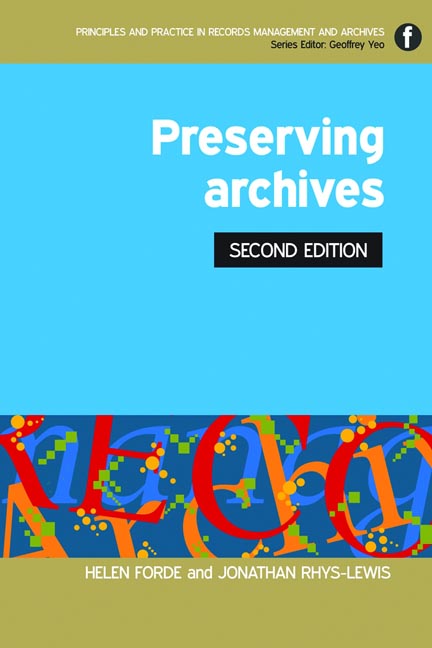Book contents
- Frontmatter
- Contents
- Introduction to the series Geoffrey Yeo
- Preface to the Second Edition
- Acknowledgements
- 1 Introducing archive preservation
- 2 Understanding archival materials and their characteristics
- 3 Managing digital preservation
- 4 Archive buildings and their characteristics
- 5 Safeguarding the building and its contents
- 6 Managing archival storage
- 7 Managing risks and avoiding disaster
- 8 Creating and using surrogates
- 9 Moving the records
- 10 Exhibiting archives
- 11 Handling the records
- 12 Managing a pest control programme
- 13 Training and the use of volunteers
- 14 Putting preservation into practice
- Appendices
- Bibliography
- British and international standards relating to archive preservation
- Index
7 - Managing risks and avoiding disaster
Published online by Cambridge University Press: 09 June 2018
- Frontmatter
- Contents
- Introduction to the series Geoffrey Yeo
- Preface to the Second Edition
- Acknowledgements
- 1 Introducing archive preservation
- 2 Understanding archival materials and their characteristics
- 3 Managing digital preservation
- 4 Archive buildings and their characteristics
- 5 Safeguarding the building and its contents
- 6 Managing archival storage
- 7 Managing risks and avoiding disaster
- 8 Creating and using surrogates
- 9 Moving the records
- 10 Exhibiting archives
- 11 Handling the records
- 12 Managing a pest control programme
- 13 Training and the use of volunteers
- 14 Putting preservation into practice
- Appendices
- Bibliography
- British and international standards relating to archive preservation
- Index
Summary
Introduction
Disaster planning is truly not for the faint of heart.
(Wellheiser and Scott, 2002, iv)Avoiding disaster is an aspiration shared by many archives but disasters are adequately guarded against by few. Even after well over 20 years of publicity about the benefits of taking precautions, the value of risk assessment and the ultimate cost to an organization that suffers a disaster, embryo plans still lie unfinished, staff are still untrained and mutual help partnerships have not been forged. Articles, websites and manuals abound, but taking the first initiative still appears to be difficult in too many archives, as the above quotation hints. Little recognition is given by those in responsible positions to the long-term damage that could be caused by a disaster, not only to the documents in physical terms but also in terms of the effect on the staff, the users and the depositors. For businesses the result can be catastrophic; why should it be any different for archives?
This chapter includes:
• the reasons for developing disaster planning
• definitions
• responsibilities
• priorities for salvage
• development of a disaster control plan
• implementation of the plan
• insurance
• partnerships.
Why undertake an ‘operation-hope-not’?
The goals must be clear to all those involved, otherwise confusion will take over. They include:
• knowing, assessing and mitigating risk
• the maintenance of service
• avoiding or minimizing loss and damage to the holdings
• knowing who to call on for necessary assistance.
Recent experiences in many countries have emphasized the value of speedy recovery of information to those whose vital records have been in a disaster. But the success of these operations depends on the professional skills of those brought in to rescue the documentation. It must be remembered that a disaster is a disaster; it is not going to be cheap or easy to return to the previous status quo.
Flood disaster recovery, York, UK
Unprecedented flooding in the autumn of 2000 resulted in vital files being inundated but then rescued and air-dried at the Borthwick Institute of Historical Research, in order to allow the owners to resume business as fast as possible. The successful elements of the operation included
• a good understanding of the needs of the stricken organization
• adaptable planning and innovative solutions.
- Type
- Chapter
- Information
- Preserving Archives , pp. 99 - 122Publisher: FacetPrint publication year: 2013



